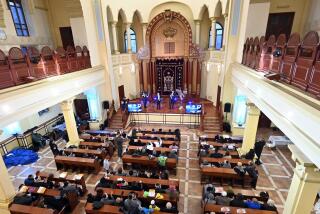Changing Times: Moscow Yeshiva Opens
- Share via
MOSCOW — When Shimon Yusim began studying Hebrew clandestinely a year ago with a group of friends in a Moscow apartment, he knew he was taking a chance.
Helin Lipskerov knew that she, too, was treading on dangerous ground when she bought a Torah five years ago on the black market.
Those days of risk seemed to fade into the distance Wednesday as Yusim and Lipskerov attended an event they would once have thought miraculous--a ceremony marking the opening of the Soviet Union’s first legal yeshiva, or Jewish religious school, since the Bolshevik Revolution in 1917.
“Praise the Lord, for He is good; this is a great moment for us,” Rabbi Joel Poupko said in Hebrew to about 200 assembled Jews.
Few Understood Words
Many did not understand a word he said, but the sound of the ancient language being spoken openly in Moscow brought a round of applause.
It was an emotional moment for Poupko, whose grandfather was jailed in 1926 for conducting Jewish studies and trying to open a yeshiva. Poupko, his voice breaking, said, “We are fulfilling the duty of our forefathers.”
He read a message from Israeli President Chaim Herzog, who praised the inauguration of the yeshiva as “an opening of a small window.”
Times are changing quickly for Jews in this officially atheistic state. In recent weeks, B’nai B’rith, the international Jewish organization, opened a chapter here, a Jewish cultural center was permitted to open--the first in more than 50 years--and the Soviet Union gave visiting Israeli diplomats permission to use their embassy building, which was closed when Moscow and Jerusalem severed diplomatic relations 21 years ago.
“We are at a critical turning point,” said Yusim, 24, who wore a yarmulke, the traditional head covering, and carried a book entitled “Beginning Hebrew.”
“I am optimistic about the future,” he said. “But I also think that while we can, we Jews must gather closer together so we can stand strong against reactionary forces.”
Until very recently, religious studies were illegal in the Soviet Union. Hebrew teachers gave lessons so secretly that many Jews did not even know it was possible to learn the language here. When caught, teachers were often jailed on charges of espousing anti-Soviet propaganda.
But under President Mikhail S. Gorbachev, the Communist Party has eased religious restrictions in an apparent effort to eliminate an issue that has sparked angry exchanges with the United States and other Western countries.
Gorbachev may see this as a way to improve international relations, but for Soviet Jews it has provided an opportunity to explore their Jewish history.
“When I finished at the university and was trying to get work, I was turned down for several jobs and was allowed to know that it was because I was Jewish,” said Lipskerov, 35, who now works as a pharmaceutical researcher. “I knew then that I did not belong with the Russian people, but I knew nothing about being Jewish.
“I came to realize that I belonged nowhere. Now that things seem freer, I began studying Hebrew three weeks ago. My hope is to have a chance to explore my Jewish roots.”
Years of Secret Effort
Hanoch Teller, an Israeli who grew up in Stamford, Conn., and now lives in Jerusalem, said the founding of the yeshiva is the result of years of clandestine work.
“Jews such as myself from abroad used to come in every several months to try to help organize it,” he said. “Finally it has paid off.”
Eighty students have been accepted for the first classes, which will be taught by five rabbis, three from Israel and two from the United States. The Soviet government will provide stipends for the students, and other financial support will come from a group of Israeli and American philanthropists.
More to Read
Sign up for Essential California
The most important California stories and recommendations in your inbox every morning.
You may occasionally receive promotional content from the Los Angeles Times.












